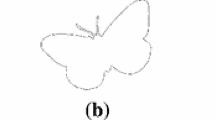Abstract
A novel shape descriptor, chord length function (CLF) which can be obtained by equal arc length partitions of a contour, is proposed. The difference of two shapes is measured by the distance between their corresponding CLF. The proposed CLF is invariant to rotation, scaling and translation. It is robust to noise and simple to compute. Experimental results indicate that CLF is an effective shape descriptor.
Preview
Unable to display preview. Download preview PDF.
Similar content being viewed by others
References
Kindratenko, V.V.: On Using Functions to Describe the Shape. Journal of Mathematical Imaging and Vision 18, 225–245 (2003)
Gonzalez, R.C., Woods, R.E.: Digital Image Processing 2, 648–649
Huang, C.-L., Huang, D.-H.: A Content-Based Image Retrieval System. Image and Vision Computing 16, 149–163 (1998)
Sanchez-Marin, F.J.: The Curvature Function Evolved in Scale-Space as a Representation of Biological Shapes. Comput. Biol. Med. 27, 77–85 (1997)
Bernier, T., Landry, J.-A.: A New Method for Representing and Matching Shapes of Natural Objects. Pattern Recognition 36, 1711–1723 (2003)
Bimbo, A.D.: Visual Information Retrieval, pp. 56–57. Morgan Kaufmann Publishers Inc., San Francisco (1999)
Salton, G.: The State of Retrieval System Evaluation. Inform. Process. Manage 28(4), 441–450 (1992)
Salton, G.: Matching and Retrieval of Distorted and Occluded Shapes Using Dynamic Programming. IEEE Transactions on Pattern Analysis and Machinge Intelligence 24(11), 1501–1516 (2002)
Author information
Authors and Affiliations
Editor information
Editors and Affiliations
Rights and permissions
Copyright information
© 2006 Springer-Verlag Berlin Heidelberg
About this paper
Cite this paper
Wang, B., Shi, C. (2006). Shape Matching Using Chord-Length Function. In: Corchado, E., Yin, H., Botti, V., Fyfe, C. (eds) Intelligent Data Engineering and Automated Learning – IDEAL 2006. IDEAL 2006. Lecture Notes in Computer Science, vol 4224. Springer, Berlin, Heidelberg. https://doi.org/10.1007/11875581_90
Download citation
DOI: https://doi.org/10.1007/11875581_90
Publisher Name: Springer, Berlin, Heidelberg
Print ISBN: 978-3-540-45485-4
Online ISBN: 978-3-540-45487-8
eBook Packages: Computer ScienceComputer Science (R0)




